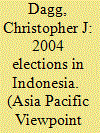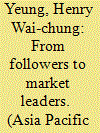|
|
|
Sort Order |
|
|
|
Items / Page
|
|
|
|
|
|
|
| Srl | Item |
| 1 |
ID:
076395


|
|
|
|
|
| Publication |
2007.
|
| Summary/Abstract |
The 2004 elections in Indonesia were incredibly complex logistically, resulted in reshaped representative institutions, and allowed presidential elections by direct vote for the first time. This paper analyses the reform processes that surrounded these elections, including reforms to the representative institutions, and the legislative and presidential elections. The different strategies of the main political personalities are analysed, and the results of the legislative elections, and both the first and second presidential election rounds, are evaluated. The paper demonstrates that the elections hold several important messages for Indonesian politicians regarding electoral expectations, and how these are changing rapidly in the post-Suharto era. Accountability, good governance and social development are among the key factors that are seen to have been important in swaying political votes, rather than traditional voting loyalties.
|
|
|
|
|
|
|
|
|
|
|
|
|
|
|
|
| 2 |
ID:
076400


|
|
|
|
|
| Publication |
2007.
|
| Summary/Abstract |
Throughout periods of political instability and economic adversity - from Dutch colonial rule, through President Suharto's period in office, to more recent times - ethnic Chinese in Indonesia have been recurrent scapegoats for violence. Suharto, especially, manipulated local perceptions of the Chinese in the economic and political arenas, to suit the needs of his government. Yet, circumstances have changed since the 1998 riots in Indonesia and Suharto's departure. Subsequent presidents have introduced legislation aimed at reducing legal restrictions on Chinese Indonesians and they, in turn, are beginning to have greater public voice through a diversity of outlets. These include the growth of numerous new print and television media; a flourishing literature sphere; the rise of a variety of political parties, both ethnicity-based and more wide-ranging; and the development of non-political organisations, some tackling discrimination and others focusing upon Chinese sociocultural needs. These channels are facilitating the appearance of new and re-emerging ethnic Chinese identities, some surfacing from over 30 years of imposed dormancy. This paper is a preliminary investigation of manifestations of these identities among ethnic Chinese in Indonesia's contemporary public realm.
|
|
|
|
|
|
|
|
|
|
|
|
|
|
|
|
| 3 |
ID:
076399


|
|
|
|
|
| Publication |
2007.
|
| Summary/Abstract |
The Indonesian military sees itself as the guarantor of national unity, the state's last line of defence against separatist movements. This paper argues that the military's methods for maintaining national unity have been counterproductive. Its counter-insurgency wars in Aceh and Papua have exacerbated the sense of alienation from Indonesia that the people in these provinces have felt. In this post-Suharto era of political reform, the military has been unable to recognise that its old methods have failed, even after its obvious failure in East Timor, whose people, after living under a 24-year military occupation, rejected continued integration with Indonesia in a referendum in 1999. The fact that the politicians in the legislative and executive branches of the state have tended to encourage the military to persist with its old methods suggests that the military by itself should not be faulted. Only political resolutions, such as the Helsinki agreement for ending the conflict in Aceh - an agreement that resulted more from the devastation of the December 2004 tsunami than from the Indonesian military's counter-insurgency warfare - offer any guarantee of national unity.
Top of Form 1
Bottom of Form 1
Top of Form 2
Bottom of Form 2
The Indonesian military sees itself as the guarantor of national unity, the state's last line of defence against separatist movements. This paper argues that the military's methods for maintaining national unity have been counterproductive. Its counter-insurgency wars in Aceh and Papua have exacerbated the sense of alienation from Indonesia that the people in these provinces have felt. In this post-Suharto era of political reform, the military has been unable to recognise that its old methods have failed, even after its obvious failure in East Timor, whose people, after living under a 24-year military occupation, rejected continued integration with Indonesia in a referendum in 1999. The fact that the politicians in the legislative and executive branches of the state have tended to encourage the military to persist with its old methods suggests that the military by itself should not be faulted. Only political resolutions, such as the Helsinki agreement for ending the conflict in Aceh - an agreement that resulted more from the devastation of the December 2004 tsunami than from the Indonesian military's counter-insurgency warfare - offer any guarantee of national unity.
|
|
|
|
|
|
|
|
|
|
|
|
|
|
|
|
| 4 |
ID:
076392


|
|
|
|
|
| Publication |
2007.
|
| Summary/Abstract |
It has become conventional wisdom in management literature that family-owned business is restricted by its management practices and, therefore, cannot grow beyond a certain size. In the case of Chinese family firms, these practices are related to paternalism, nepotism, personalism, and fragmentation. This paper examines three detailed qualitative case studies of Chinese family firms from Hong Kong that have relentlessly pursued growth through internationalization. It argues that venturing into foreign markets and transnational operations has become an effective means for Chinese family firms to expand beyond the limits of domestic markets and centripetal management structures. International business strategies enable Chinese family firms to socialize trusted members into the corporate "family," provide a training ground for the future heir to the patriarch, and consolidate networks of personal and business relationships. There are, therefore, no a priori reasons to support the alleged limits to the growth of Chinese family firms in their international context.
|
|
|
|
|
|
|
|
|
|
|
|
|
|
|
|
| 5 |
ID:
076398


|
|
|
|
|
| Publication |
2007.
|
| Summary/Abstract |
Popular movements in Aceh and Papua seeking separation from Indonesia must be understood in the context of earlier nationalist movements in history, including Indonesia's own movement for independence from the Netherlands. Movements in Aceh and Papua have built a sense of identity, considering themselves to be 'notion-states' even if they are not yet nation-states. This process parallels Indonesian identity formation in the early twentieth century. Aceh originally combined local, Indonesian and Islamic identities, but intrusion by central government institutions sparked a defensive nationalist reaction, which was stimulated further by uneven economic development and by repressive tactics by the centre. Papua was incorporated into Indonesia by means that led local people to believe they had been denied their right to self-determination, spurring a historical sense of grievance and a collective identity of shared suffering much like that in Aceh. By the end of Sukarno's Guided Democracy and Suharto's New Order, both territories had passed a point of no return in their nationalism. Repressive tactics have failed to contain aspirations for independence; a new approach based on dialogue is needed.
|
|
|
|
|
|
|
|
|
|
|
|
|
|
|
|
| 6 |
ID:
076393


|
|
|
|
|
| Publication |
2007.
|
| Summary/Abstract |
The paper argues that post-structural political economy (PSPE) offers geography and geographers interesting potential for the development of a style of geographic inquiry that has qualities that may be constitutive of progressive spaces. This new style of inquiry is seen as adding to the repertoire of political strategies and potential geographies of responsibility and extending notions of ethical behaviours. Issues relating to the assemblage of PSPE as a distinctive approach to knowledge production are considered and situated in the Australasian context. Discussion focuses especially on insight about the use of PSPE derived from three illustrative research case studies (a project on learning challenges in sheep meat and dairy supply chain realignment, tensions around fisheries management in New Zealand and an international workshop series on the topic of governmentality). The case studies provide a lens on the socio-spatial relationships between globalisation and governance and interrogate the value of PSPE for understanding the connections between individual choices, governing practices and the construction of the globalising economy. The PSPE approach if actively incorporated into research processes may have important implications for future relationships between social responsibility, national economic development and globalisation
|
|
|
|
|
|
|
|
|
|
|
|
|
|
|
|
| 7 |
ID:
076397


|
|
|
|
|
| Publication |
2007.
|
| Summary/Abstract |
As the largest archipelagic nation in the world, with distinctive environmental conditions and biodiversity, Indonesia on the one hand has tremendous natural and environmental riches while on the other hand faces a variety of environmental problems. After three decades of the New Order era, 1967-1998, Indonesian society is in a crucial transformation process towards a more democratic era. At the same time, as indicated in that country's decentralisation laws No. 22/99 and 25/99, Indonesia is also shifting its style of government, from a centralistic to decentralised one. These two trends are happening simultaneously with globalisation prompting a flow of global capital that directly increases pressure on the Indonesian environment. This paper evaluates the decentralisation of environmental management programmes in Indonesia and focuses on the implications of these changes. The weaknesses of current environmental policies and programmes in Indonesia, which give too dominant a role to the government and neglect civil society's involvement in natural resources and environmental management, are analysed. Further, the paper addresses the lack of attention to date to issues of environmental rights and justice that create many complex environmental and social conflicts throughout Indonesia. We conclude by recommending some fundamental changes to environmental policies and programmes in the decentralised system
|
|
|
|
|
|
|
|
|
|
|
|
|
|
|
|
| 8 |
ID:
076401


|
|
|
|
|
|
|
|